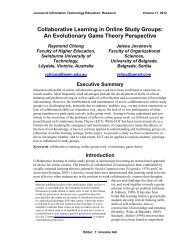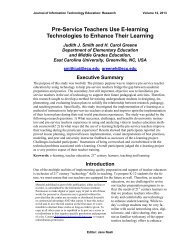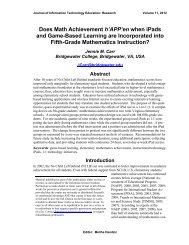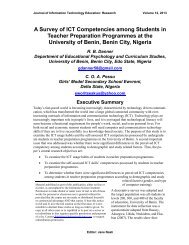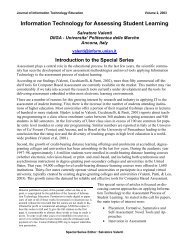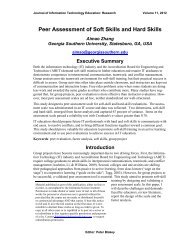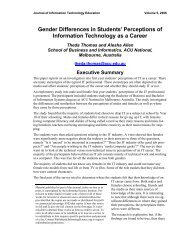Put Title Here Using Heading 1 Style - Journal of Information ...
Put Title Here Using Heading 1 Style - Journal of Information ...
Put Title Here Using Heading 1 Style - Journal of Information ...
You also want an ePaper? Increase the reach of your titles
YUMPU automatically turns print PDFs into web optimized ePapers that Google loves.
Thomas, Davis, & Kazlauskas<br />
try, ability to express themselves when reasoning with others, and their ability to analyse other<br />
people’s points <strong>of</strong> view. A five-point Likert scale was used. There was a significant improvement<br />
in all but one <strong>of</strong> these aspects. Although Question 14 did not significantly increase, it did have the<br />
strongest positive view in 2003 and showed an increased positive view in 2005.<br />
Some <strong>of</strong> the first year students, in particular some <strong>of</strong> the international students, mentioned how<br />
the approach used helped them to gain confidence:<br />
“As a 1 st year we are bit nervous. I believe this course helps to get confident. Overall<br />
change <strong>of</strong> way – like before I thought uni is very hard, I can’t study as my English is not<br />
1 st language – but I argue with myself. Why I can’t if others can. Now I am doing quite<br />
well. (Punctuation inserted.)<br />
Even though the students were specifically asked to reflect on both the positive and negative factors<br />
<strong>of</strong> the subject, by 2005 the number <strong>of</strong> negative comments had almost disappeared. Of the 52<br />
students who answered the question <strong>of</strong> what they liked LEAST about the subject, 15 students<br />
(29%) remarked that they enjoyed everything or that there was nothing that they did not like. The<br />
most common least-liked aspect <strong>of</strong> the subject was the section on algorithms (6 students – 12%),<br />
closely followed by the early start (8am) with four students (8%) saying this. One specific statement<br />
was the following:<br />
“There is nothing that I can put in this category because I thoroughly enjoyed every aspect<br />
<strong>of</strong> this subject. I wish that every subject I studied at university was as interesting and<br />
enjoyable as this one.”<br />
More detail on this research can be found in Davis, Thomas and Kazlauskas (2006).<br />
Table 4: Examples <strong>of</strong> development <strong>of</strong> Critical Thinking skills through the curriculum<br />
Critical Thinking Year Semester Subject Name Scaffolding / Metacognitive Skills<br />
Skill<br />
Level<br />
Critical and<br />
1 1 Reasoning and Critical Framework<br />
Analytical thinking<br />
Thinking for IS Pr<strong>of</strong>essionals Prompting<br />
for Programming<br />
Meta-cognitive skills developed<br />
1 2 Programming Techniques 1 Peer and self review used<br />
2 1 Programming Techniques 2 Peer and self review used<br />
Most scaffolding removed<br />
2 1 Database Design Questions and Prompting<br />
Problem Solving for 1 1 Reasoning and Critical Questions and Prompting<br />
Systems Analysis &<br />
Thinking for IS Pr<strong>of</strong>essionals Meta-cognitive skills developed<br />
Design<br />
1 2 Systems Analysis and Design<br />
Questions and Prompting<br />
3 2 IT Project Student scaffolds themselves<br />
Writing Essays that 1 1 Reasoning and Critical Questions and Prompting<br />
include argument<br />
Thinking for IS Pr<strong>of</strong>essionals Reflection<br />
Meta-cognitive skills developed<br />
1 2 Systems Analysis and Design<br />
Prompting<br />
2/3 Ethics and Informatics Self Review<br />
Reflection<br />
Table 4 gives an indication <strong>of</strong> the different higher-order thinking skills that are being developed<br />
in this subject and where they are used within the <strong>Information</strong> Systems course. The specific way<br />
in which the skills are developed is explained in the examples in the sections that follow. This is<br />
not an exhaustive list <strong>of</strong> how the skills could be developed in other subjects or topics. These are<br />
examples from subjects that are taught by one or more <strong>of</strong> the authors. They have been chosen to<br />
335



